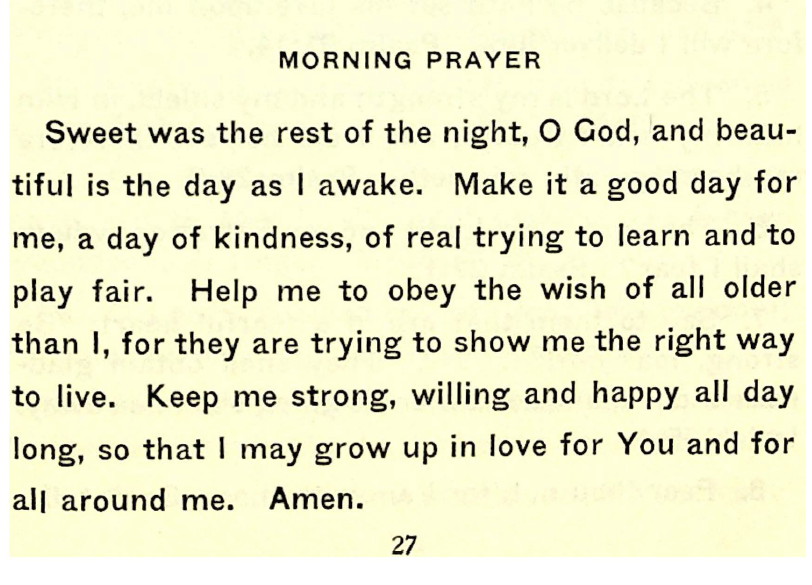| Contribute a translation | Source (English) |
|---|---|
Sweet was the rest of the night, O God, and beautiful is the day as I awake. | |
Make it a good day for me, a day of kindness, of real trying to learn and to play fair. | |
Help me to obey the wish of all older than I, for they are trying to show me the right way to live. | |
Keep me strong, willing and happy all day long, so that I may grow up in love for You and for all around me. Amen. |
“Morning Prayer (for Older Children)” by Rabbi Clifton Harby Levy is found in The Helpful Manual (Centre of Jewish Science, 1927), p. 27.
Source(s)


“Morning Prayer (for Older Children) by Rabbi Clifton Harby Levy (1927)” is shared through the Open Siddur Project with a Creative Commons Public Domain Dedication 1.0 Universal license.
Rabbi Clifton Harby Levy (1867–1962), was a Reform rabbi in the United States. Born in New Orleans, he was ordained at Hebrew Union College (1890), served as rabbi of Congregation Gates of Hope, New York City (1890–91), and as superintendent of classes for immigrant children established by the Baron de Hirsch Fund. Levy later served congregations in Lancaster, Pennsylvania (1892–94) and Baltimore, Maryland (1894–96), where he organized a Jewish kindergarten in a religious school and the first United Hebrew Charities. He founded Tremont Temple, Bronx, New York, and was its rabbi from 1906 to 1921. He left the pulpit rabbinate in 1921 and in 1924 organized the Centre of Jewish Science, New York City. As part of the Jewish Science movement, it sought to counter the influence of Christian Science among acculturated American Jews and to inject spirituality into the Reform Jewish synagogue. He was a founding member of the American Council for Judaism, which consisted primarily of anti-Zionist Reform rabbis and laymen. While still a student, Levy published a five-act Purim play, Haman and Mordecai (1886). During his stay in Baltimore he edited Jewish Comment. He edited The Bible in Art (1936) and The Bible in Pictures (1942), and served as art editor of the Universal Jewish Encyclopedia.
Aharon Varady (M.A.J.Ed./JTSA Davidson) is a volunteer transcriber for the Open Siddur Project. If you find any mistakes in his transcriptions, please let him know. Shgiyot mi yavin; Ministarot naqeni שְׁגִיאוֹת מִי־יָבִין; מִנִּסְתָּרוֹת נַקֵּנִי "Who can know all one's flaws? From hidden errors, correct me" (Psalms 19:13). If you'd like to directly support his work, please consider donating via his Patreon account. (Varady also translates prayers and contributes his own original work besides serving as the primary shammes of the Open Siddur Project and its website, opensiddur.org.)
Stable Link:
https://opensiddur.org/?p=50224
Associated Image:
(This image is set to automatically show as the "featured image" in shared links on social media.)
Re-formatted:
ODT
Terms of Use:
Be a mentsch (a conscientious, considerate person) and adhere to the following guidelines:
- Properly attribute the work to Clifton Harby Levy and Aharon N. Varady (transcription).
- Clearly indicate the date you accessed the work and in what ways, if any, you modified it. (If you have adapted the work, let us know so that the contributor might consider endorsing your revision.)
- Provide the stable link to this resource: <https://opensiddur.org/?p=50224>.
- Indicate that the original work was shared under the Creative Commons Zero (CC 0) Universal license a Public Domain dedication. (To redistribute or remix this work in any format, modified or unmodified, you must refer to the terms of the license under which the work is shared.)
Additional Notes:
- The views expressed in this work represent the views of their creator(s) and do not necessarily represent the views of the Open Siddur Project's developers, its diverse community of volunteer contributors, or its institutional partners.
- We strongly advise against printing sacred texts and art containing divine names as these copies must be regarded with reverence, complicating their casual treatment and disposal.
- If you must dispose of a printed sacred text (one containing Divine Names), please locate the closest genizah (often established by a synagogue) and contact its custodians for further instructions. We also recommend using Morah Yehudis Fishman's Prayer for Adding a Work to the Genizah.
Support this work:
The Open Siddur Project is a volunteer-driven, non-profit, non-commercial, non-denominational, non-prescriptive, gratis & libre Open Access archive of contemplative praxes, liturgical readings, and Jewish prayer literature (historic and contemporary, familiar and obscure) composed in every era, region, and language Jews have ever prayed. Our goal is to provide a platform for sharing open-source resources, tools, and content for individuals and communities crafting their own prayerbook (siddur). Through this we hope to empower personal autonomy, preserve customs, and foster creativity in religious culture.
ויהי נעם אדני אלהינו עלינו ומעשה ידינו כוננה עלינו ומעשה ידינו כוננהו "May the pleasantness of אדֹני our elo’ah be upon us; may our handiwork be established for us — our handiwork, may it be established." –Psalms 90:17

![night prayer [for older children] (Clifton Harby Levy 1927)](https://opensiddur.org/wp-content/uploads/2023/04/night-prayer-for-older-children-Clifton-Harby-Levy-1927-250x250.png)








Leave a Reply